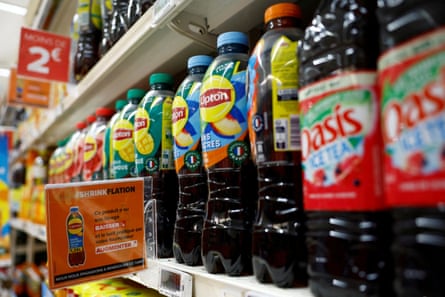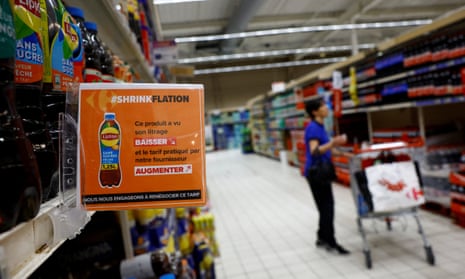The French supermarket chain Carrefour has put labels on its shelves this week warning shoppers of “shrinkflation”, the phenomenon where manufacturers reduce pack sizes rather than increase prices.
It has slapped price warnings on products from Lindt chocolates to Lipton iced tea to pressure top consumer goods suppliers Nestlé, PepsiCo and Unilever to tackle the issue in advance of much-anticipated contract talks.
Since Monday, Carrefour has been putting stickers on products that have shrunk in size but cost more even after raw materials prices have eased, to rally consumer support as retailers prepare to face the world’s biggest brands in negotiations due to start soon and end by 15 October.
Carrefour has marked 26 products in its stores in France with the labels, which say: “This product has seen its volume or weight fall and the effective price from the supplier rise.”
For example, Carrefour said a bottle of sugar-free peach-flavoured Lipton iced tea, produced by PepsiCo, shrank to 1.25 litres (0.33 gallon) from 1.5 litres, resulting in a 40% effective increase in the price a litre.
Guigoz infant formula produced by Nestlé went from 900 grams (31.75 oz) to 830 grams, while Unilever’s Viennetta ice-cream cake shrank to 320 grams from 350 grams.
“Obviously, the aim in stigmatising these products is to be able to tell manufacturers to rethink their pricing policy,” Stefen Bompais, the director of client communications at Carrefour, said in an interview.

The Carrefour chief executive, Alexandre Bompard, who also heads the retail industry lobby group FDC, has repeatedly said consumer goods companies are not cooperating in efforts to cut the price of thousands of staples despite a fall in the cost of raw materials.
In this he is backed by the French finance minister, Bruno Le Maire, who in June summoned 75 big retailers and consumer groups to his ministry urging them to cut prices. After a new round of meetings last month, Le Maire said Unilever, Nestlé and PepsiCo were among companies not toeing the line on prices.
Lindt’s “chocolat au lait extra fin” was one of three of the Swiss chocolatier’s products named by Carrefour in its shrinkflation list.
“Lindt & Sprüngli increased its prices group-wide on average by 9.3% in line with local cost structures,” a company spokesperson told Reuters. “We have made a concerted effort to compensate for increased costs by increasing efficiency as much as possible. Therefore, we have only passed on the costs we could not absorb ourselves in the form of price increases to our customers.”
PepsiCo did not respond to a request for comment. Nestlé and Unilever declined to comment.
Consumer groups say shrinkflation is a widespread practice, which supermarkets like Carrefour are also guilty of in their own-label products.
The shrinkflation warnings are in all French Carrefour stores, and will last until the targeted suppliers agree to price cuts, Bompais said. The retailer could extend warnings to other goods, but does not plan to extend the initiative to other countries.
